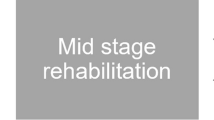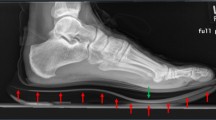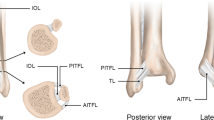Abstract
Healthcare professionals prescribe foot orthoses (FOs) for treatment and prevention of lower limb injuries, but previous reviews of the effectiveness of FOs have been inconclusive. We have therefore performed a review emphasizing the magnitude of treatment effects to evaluate the clinical effectiveness of FOs in the treatment and prevention of lower limb injuries.
Qualifying studies were mainly controlled trials, but some uncontrolled clinical trials of patients with chronic injuries were analysed separately. Injuries included plantar fasciitis, tibial stress fractures and patellofemoral pain syndrome; these were included because of the large treatment costs for these frequent injuries in New Zealand. Outcomes were pain, comfort, function and injury status. Continuous measures were expressed as standardized differences using baseline between-subject standard deviations, and magnitudes were inferred from the intersection of 90% confidence intervals with thresholds of a modified Cohen scale. Effects based on frequencies were expressed as hazard ratios and their magnitudes were inferred from intersection of confidence intervals with a novel scale of thresholds.
The effects of FOs for treatment of pain or injury prevention were mostly trivial. FOs were not effective in treating or preventing patellofemoral pain syndrome. Some studies showed moderate effects for treatment of plantar fasciitis. Only a few studies showed moderate or large beneficial effects of FOs in preventing injuries.
Customized semi-rigid FOs have moderate to large beneficial effects in treating and preventing plantar fasciitis and posterior tibial stress fractures, and small to moderate effects in treating patellofemoral pain syndrome. Given the limited randomized controlled trials or clinical controlled trials available for the injuries of interest, it may be that more or less benefit can be derived from the use of FOs, but many studies did not provide enough information for the standardized effect sizes to be calculated. Further research with randomized controlled trials is needed to establish the clinical utility of a variety of FOs for the treatment and prevention of various lower limb injuries.







Similar content being viewed by others
Notes
It should be noted that the thickness of the FOs was unclear from the description provided in the paper; therefore, it was classified as semi-rigid.
References
Donatelli R. Abnormal biomechanics of the foot and ankle. J Orthop Sports Phys Ther 1987; 9 (1): 11–6
Crawford F, Thomson C. Interventions for treating plantar heel pain. Cochrane Database Syst Rev 2003; (3): CD000416
Collins N, Bisset L, McPoil TG, et al. Foot orthoses in lower limb overuse conditions: a systematic review and meta-analysis. Foot Ankle Int 2007; 28 (3): 396–412
Landorf KB, Keenan A-M. Do foot orthoses prevent injury?Boston (MA): Blackwell Publishing, 2007.ai]
Irving DB, Cook JL, Menz HB. Factors associated with chronic plantar heel pain: a systematic review. J Sci Med Sport 2006; 9 (1-2): 11–22
Riddle DL, Pulisic M, Pidcoe P, et al. Risk factors for plantar fasciitis: a matched case-control study. J Bone Joint Surg 2003; 85A (5): 872–7
Rome K, Handoll HH, Ashford R. Interventions for preventing and treating stress fractures and stress reactions of bone of the lower limbs in young adults. Cochrane Database Syst Rev 2005; (2): CD000450
Ekenman I, Milgrom C, Finestone A, et al. The role of biomechanical shoe orthoses in tibial stress fracture prevention. Am J Sports Med 2002; 30 (6): 866–70
Finestone A, Giladi M, Elad H, et al. Prevention of stress fractures using custom biomechanical shoe orthoses. Clin Orthop 1999; 360: 182–90
Milgrom C, Giladi M, Kashtan H, et al. A prospective study of the effect of a shock-absorbing device on the incidence of stress fractures in military recruits. Foot Ankle 1985; 6 (2): 101–4
Finestone A, Novack V, Farfel A, et al. A prospective study of the effect of foot orthoses composition and fabrication on comfort and the incidence of overuse injuries. Foot Ankle Int 2004 Jul; 25 (7): 462–6
McPoil TG, Cornwall MW. Rigid versus soft foot orthoses: a single subject design. J Am Podiatr Med Assoc 1991 Dec; 81 (12): 638–42
Duddy RK, Duggan RJ, Visser HJ, et al. Diagnosis, treatment,and rehabilitation of injuries to the lower leg and foot. Clin Sports Med 1989 Oct; 8 (4): 861–76
Witvrouw E, Werner S, Mikkelsen C, et al. Clinical classification of patellofemoral pain syndrome: guidelines for nonoperative treatment. Knee Surg Sports Traumatol Arthrosc 2005; 13 (2): 122–30
Eng JJ, Pierrynowski MR. Evaluation of soft foot orthotics the treatment of patellofemoral pain syndrome. Phys Ther 1993 Feb; 73 (2): 62–70
Bizzini M, Childs JD, Piva SR, et al. Systematic review of the quality of randomized controlled trials for patellofemoral pain syndrome. J Orthop Sports Phys Ther 2003 Jan; 33 (1): 4–20
Fulkerson JP. Diagnosis and treatment of patients with patellofemoral pain. Am J Sports Med 2002; 30 (3): 447–56
Sutlive TG, Mitchell SD, Maxfield SN, et al. Identification of individuals with patellofemoral pain whose symptoms improved after a combined program of foot orthosis use and modified activity: a preliminary investigation. Phys Ther 2004; 84 (1): 49–61
D’Hondt NE Struijs PA, Kerkhoffs GM, et al. Orthotic devices for treating patellofemoral pain syndrome. Cochrane Database Syst Rev 2002; (2): CD002267
Eng JJ, Pierrynowski MR. The effect of soft foot orthotics on three-dimensional lower-limb kinematics during walking and running. Phys Ther 1994 Sep; 74 (9): 836–44
Heiderscheit B, Hamill J, Tiberio D. A biomechanical perspective: do foot orthoses work? Br J Sports Med 2001; 35 (1): 4–5
Nigg BM, Nurse MA, Stefanyshyn DJ. Shoe inserts and orthotics for sport and physical activities. Med Sci Sports Exerc 1999 Jul; 31 (7 Suppl.): 421–8
Krivickas LS. Anatomical factors associated with overuse sports injuries. Sports Med 1997 Aug; 24 (2): 132–46
Nigg BM, Stergiou P, Cole G, et al. Effect of shoe inserts on kinematics, center of pressure, and leg joint moments during running. Med Sci Sports Exerc 2003 Feb; 35 (2): 314–9
Ball KA, Afheldt MJ. Evolution of foot orthotics: part 1. Coherent theory or coherent practice? J Manipulative Physiol Ther 2002 Feb; 25 (2): 116–24
Cochrane Collaboration. Cochrane handbook for systematic reviews of interventions. 4.2.5. Updated May 2005
McLauchlan GJ, Handoll HH. Interventions for treating acute and chronic tendonitis. Cochrane Database Syst Rev 2001; (2): CD000232
Ferrari J, Higgins JPT, Prior TD. Interventions for treating hallux valgus (abductovalgus) and bunions. Cochrane Database Syst Rev 2004; (1): CD000964
Handoll HH, Rowe BH, Quinn KM, de Bie R. Interventions for preventing ankle ligament injuries. Cochrane Database Syst Rev 2001; (3): CD000018
Yeung EW, Yeung SS. Interventions for preventing lower limb soft-tissue injuries in runners. Cochrane Database Syst Rev 2001; (3): CD001256
Kirby K. Foot and lower extremity biomechanics II: precision intricast newsletters 1997—2003. J Am Podiatr Med Assoc 2003; 93: 503
Rome K, Brown CL. Randomized clinical trial into the impact of rigid foot orthoses on balance parameters in excessively pronated feet. Clin Rehabil 2004 Sep; 18 (6): 624–30
Wu KK. Foot orthoses: principles and clinical applications. Baltimore (MD): Williams and Wilkins, 19
Hawke F, Burns J, Radford JA, et al. Custom-made foot or thoses for the treatment of foot pain. Cochrane Database Syst Rev 2008; (3): CD006801
Root ML, Orien WP, Weed JH. Normal and abnormal functions of the foot. Los Angeles (CA): Clinical Biomechanics Corp.,1977
McPoil TG, Cornwall MW. Relationship between three static angles of the rearfoot and the pattern of rearfoot motion during walking. J Orthop Sports Phys Ther 1996; 23 (6): 370–5
Pierrynowski MR, Smith SB. Effect of patient position on the consistency of placing the rearfoot at subtalar neutral. J Am Podiatr Med Assoc 1997; 87: 399–406
McKenzie DC, Clement DB, Taunton JE. Running shoes, orthotics and injuries. Sports Med 1985 Sep-Oct; 2 (5): 334–47
Smith LS, Clarke TE, Hamill CL, et al. The effects of soft and semirigid orthoses upon rear foot movement in running. J Am Podiatr Med Assoc 1986; 76: 227–31
Pagliano J. Management of the pronated and supinated foot. Med Sport Sci 1987; 23: 55–160
Malas B. Implementing outcome measurement in O & P education. J Prosthet Orthot 2002; 14 (2): 78–81
Cohen J. Statistical power analysis for the behavioral sciences. Hillsdale (NJ): Lawrence Erlbaum, 1988
Hopkins WG. A new view of statistics [online]. Available from URL: http://sportsci.org/resource/stats/effectmag.html [Accessed 2008 Jul 10]
Sterne JAC, Smith GD. Sifting the evidence: what’s wrong with significance tests. BMJ 2001; 322: 226–31
Batterham AM, Hopkins WG. Making meaningful inferences about magnitudes. Sport Sci 2005; 9: 6–13
Winemiller MH, Billow RG, Laskowski ER, et al. Effect of magnetic vs sham-magnetic insoles on nonspecific foot pain in the workplace: a randomized, double-blind, placebo-controlled trial. Mayo Clin Proc 2005 Sep; 80 (9): 1138–45
Schwellnus MP, Jordaan G, Noakes TD. Prevention of common overuse injuries by the use of shock absorbing insoles. Am J Sports Med 1990; 18 (6): 636–41
Andrish JT, Bergfeld JA, Walheim J. A prospective study on the management of shin splints. J Bone Joint Surg 1974; 56-A (8): 1697–700
Fauno P, Kalund S, Andreasen I, et al. Soreness in lower extremities and back is reduced by use of shock absorbing heel inserts. Int J Sports Med 1993; 14: 288–90
Gardner LI, Dziados JE, Jones BH, et al. Prevention of lower extremity stress fractures: a controlled trial of a shock absorbent insole. Am J Public Health 1988 Dec; 78 (12): 1563–7
Simkin A, Leichter I, Giladi M, et al. Combined effect of foot arch structure and an orthotic device on stress fractures. Foot Ankle 1989 Aug; 10 (1): 25–9
Esterman A, Pilotto L. Foot shape and its effect on functioning in Royal Australian Air Force recruits. Part 2: pilot, randomized, controlled trial of orthotics in recruits with flat feet. Mil Med 2005; 170 (7): 629–33
Gross MT, Byers JM, Krafft JL, et al. The impact of custom semirigid foot orthotics on pain and disability for individuals with plantar fasciitis. J Orthop Sports Phys Ther 2002 Apr; 32 (4): 149–57
Landorf KB, Keenan AM, Herbert RD. Effectiveness of foot orthoses to treat plantar fasciitis: a randomized trial. Arch Int Med 2006 Jun 26; 166 (12): 1305–10
Pfeffer G, Bacchetti P, Deland J, et al. Comparison of custom and prefabricated orthoses in the initial treatment of proximal plantar fasciitis. Foot Ankle Int 1999 Apr; 20 (4): 214–21
Lynch D, Goforth W, Martin J, et al. Conservative treatment of plantar fasciitis: a prospective study. J Am Podiatr Med Assoc 1998; 88 (8): 375–80
Martin JE, Hosch JC, Goforth WP, et al. Mechanical treatment of plantar fasciitis: a prospective study. J Am Podiatr Med Assoc 2001; 91 (2): 55–62
Johnston LB, Gross MT. Effects of foot orthoses on quality of life for individuals with patellofemoral pain syndrome. J Orthop Sports Phys Ther 2004; 34 (8): 440–8
Stell JF, Buckley JG. Controlling excessive pronation: a comparison of casted and non-casted orthoses. The Foot 1998 8 (4): 210–4
Seligman DA, Dawson DR. Customized heel pads and soft orthotics to treat heel pain and plantar fasciitis. Arch Phys Med Rehabil 2003 Oct; 84 (10): 1564–7
Saxena A, Haddad J. The effect of foot orthoses on patellofemoral pain syndrome. J Am Podiatr Med Assoc 2003; 93 (4): 264–71
Larsen K, Weidich F, Leboeuf-Yde C. Can customized biomechanic shoe orthoses prevent problems in the back and lower extremities? A randomized, controlled intervention trial of 146 military conscripts. J Manipulative Physiol Ther 2002;25 (5): 326–31
Sherman RA, Karstetter KW, May H, et al. Prevention of lower limb pain in soldiers using shock-absorbing orthotic inserts. J Am Podiatr Med Assoc 1996; 86 (3): 117–22
Withnall RD, Eastaugh J, Freemantle N. Do shock absorbing insoles reduce lower limb injury? A randomised trial in British military subjects. Med Sci Sports Exerc 2005; 37 (5): 346
Stefanyshyn D, Stergiou P, Lun VMY, Meeuwisse WH, Nigg Bag 92006, Auckland, New Zealand. BM. Knee joint moments and patellofemoral pain syndrome in runners. Part 1: a case control study. Part 2: a prospective runners. Part 1: a case control study. Part 2: a prospective cohort study. 4th Symposium on Footwear Biomechanics 1999 Aug 5-7; Canmore (AB), 86-7
Acknowledgements
Funding was received from the New Zealand Accident Compensation Corporation for the preparation of this review and the authors have no conflicts of interest relevant to its contents.
Author information
Authors and Affiliations
Corresponding author
Rights and permissions
About this article
Cite this article
Hume, P., Hopkins, W., Rome, K. et al. Effectiveness of Foot Orthoses for Treatment and Prevention of Lower Limb Injuries. sports med 38, 759–779 (2008). https://doi.org/10.2165/00007256-200838090-00005
Published:
Issue Date:
DOI: https://doi.org/10.2165/00007256-200838090-00005




